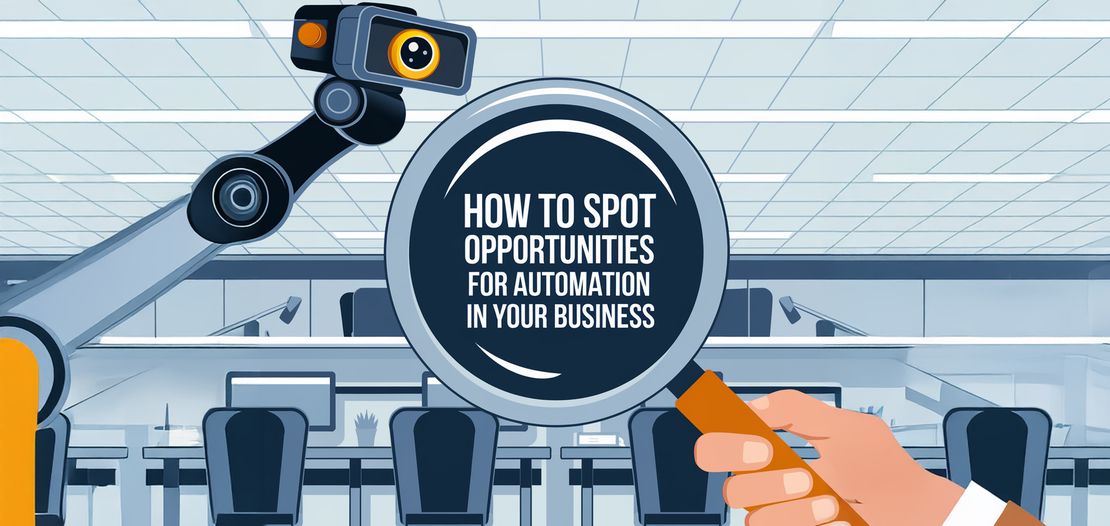
How to Spot Opportunities for Automation in Your Business
- Enrique García Galán
- Automation
- January 22, 2025
Table of Contents
Automation is no longer just a tool for tech giants—businesses of all sizes can benefit from it. But as a business owner, you might wonder: “Where do I even begin?”
If you’ve found yourself spending too much time on repetitive tasks or struggling with inefficiencies, this guide is for you. Let’s explore how to identify opportunities for automation in your business and how our team can help you take the next step.
Why automate?
Automation uses software to handle repetitive tasks, giving you and your team more time to focus on what truly matters—growing your business. Here are some benefits of automation:
- Save Time: Automating manual processes frees up your team for strategic tasks.
- Reduce Errors: reduces human errors in tasks like data entry.
- Scale Efficiently: handle more customers or transactions without hiring more staff.
- Cut Costs: automating processes often costs less than manual labor over time.
Signs your business needs automation
In today’s fast-paced world, staying competitive often means finding smarter ways to work. If you’re wondering whether it’s time to introduce automation into your business operations, here are some telltale signs that your business could benefit from it:
Repetitive tasks are taking over: if your team is spending significant time on repetitive tasks like data entry, inventory updates, or customer follow-ups, automation can free up their time for more strategic work.
Human errors are becoming costly: mistakes in invoicing, order processing, or data management can be expensive. Automation reduces human error by ensuring consistent, accurate execution.
Your team feels overwhelmed: when employees are stretched thin or overwhelmed by the volume of work, automation can alleviate their workload, reducing stress and burnout.
Slow response times are hurting Customer Satisfaction: if customers are waiting too long for responses or support, automating customer service through chatbots or email workflows can dramatically improve response times.
Scaling your business feels impossible: growth should be exciting, not stressful. If expanding operations feels overwhelming due to manual processes, automation can streamline workflows and make scaling seamless.
You’re struggling to keep track of Data: managing customer information, sales data, or inventory manually can lead to inefficiencies and lost opportunities. Automation helps consolidate and analyze data for better decision-making.
Your competitors are pulling ahead: if your competitors are using automation to innovate and gain an edge, your business risks falling behind. Automating key processes can help you stay competitive and relevant.
By recognizing these signs early and implementing the right automation tools, you can save time, reduce costs, and position your business for long-term success. Take a step back and assess your operations—automation might just be the game-changer your business needs!
Where to start: key areas for automation
Here are some business functions where automation can make an immediate impact:
Customer communication: Automate responses to FAQs using chatbots or email templates.
Data management: Use tools to automate data entry, reporting, or syncing between systems.
Inventory and order tracking: Streamline inventory updates and order processing to save time.
Billing and invoicing: Automate invoice generation, payment reminders, and record-keeping.
Getting started
Here’s how to take the first step toward automating your business:
Evaluate Your Processes: list the tasks that feel repetitive, time-consuming, or error-prone.
Take Action: start small—automate one process and scale as you see the results.
Use automation platforms: tools like Zapier, Integromat, or Microsoft Power Automate can help you automate tasks without coding.
Ready to automate?
Automation is a game-changer for businesses of all sizes. Just start with small automations.
If you need to know more about When, What, and Why to Automate, we have an article where we explain it in detail.
How we can help
Identifying the right tasks to automate is only the beginning. Implementing automation tools tailored to your business requires expertise—and that’s where we come in.
Automation doesn’t have to be complicated. Leave the technical details to us while you focus on growing your business!
